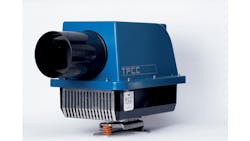PSI TECHNICS — which develops industrial positioning systems and industrial image processing technology — offers an enclosure design to protect sensitive instruments from high heat and atmospheric conditions. Whether the industrial process relies on optical sensors such as laser distance meters or optical communication systems, high temperature environments may cause sensitive components to fail. In metal manufacturing, positioning sensors or comparable devices are subject to extreme external conditions like dust or heat, and the use of unprotected sensors mounted on bridge cranes or shuttles can lead to increased wear and inaccurate measurements.
To effectively prevent sensor failures and malfunctions, PSI Technics offers a thermal protection cooling case designed to shield sensitive sensors, such as distance meters, from extreme environmental conditions. The Thermo Protection Cooling Case (TPCC) was specifically designed to protect sensitive sensor elements from environmental temperatures of up to 176°F (80°C). PSI Technics has also equipped the TPCC with a special tube that prevents reflections caused by sources of direct light to ensure a reliable operation of optical distance meters even over long distances. It eliminates interference from external light sources and ensures precise measurements at all times.
An additional advantage of the integrated tube is that it increases significantly the sensor's immunity to extraneous light. The tube compensates for ambient light, such as direct sunlight or direct illumination that may target the sensor from different directions and significantly reduces the amplitude of external light beams.
In addition, the tube protects the TPCC's glass panel from particulates, reducing the time and cost required for cleaning the sensor and ensuring precise measurements. Thanks to the thermal properties of the protective enclosure, manufacturing operations now also benefit from precise measurements over long distances in hostile environments, for example, in molten metal operations or metal assembly and fabrication processes.
PSI Technics specializes in industrial positioning systems, industrial image processing as well as thermal protection enclosures for sensitive sensors. Also, it offers EMC/EMI analyses for industrial plants, facilities, and products, as well as custom temperature and humidity monitoring and analyses using miniature data loggers.
Visit www.psi-technics.com/E
About the Author
Robert Brooks
Editor/Content Director - Endeavor Business Media
Robert Brooks has been a business-to-business reporter, writer, editor, and columnist for more than 20 years, specializing in the primary metal and basic manufacturing industries. His work has covered a wide range of topics including process technology, resource development, material selection, product design, workforce development, and industrial market strategies, among others.
Currently, he specializes in subjects related to metal component and product design, development, and manufacturing—including castings, forgings, machined parts, and fabrications.
Brooks is a graduate of Kenyon College (B.A. English, Political Science) and Emory University (M.A. English.)

